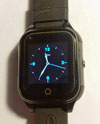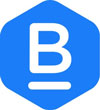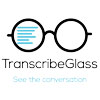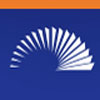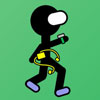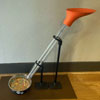
|
Design, Technology , and Engineering benefitting individuals
with disabilities and older adults in the local community |
January 13, 2023 |
|
|
|
|

Perspectives is the newsletter of the
Stanford course,
Perspectives in Assistive Technology.
Week 2 Class Sessions
This newsletter issue describes the Week 2's class
sessions.
|
Perspectives in Assistive
Technology is a Winter Quarter Stanford course - entering its
seventeenth year - that explores the design, development, and use of
assistive technology that benefits people with disabilities and older adults.
It consists of semi-weekly in-person discussions; lectures by
notable professionals, clinicians, and assistive technology users; a field
trip to an accessible inclusive playground; an Assistive Technology
Faire; and student project presentations and demonstrations.
Course website. |
Week 2
Course News

Student Enrollment -
The student enrollment for the course has dropped by 19 (to 44) as students
re-evaluate their schedule. In addition, 7 students are on the Wait List,
hoping that a Team Project vacancy opens for them - which is very likely. It
appears that there will be 9 teams of 4 students working on team
projects. |

Guest Lecturer
Schedule - The schedule of guest lecturers has been finalized. For
more information about each presenter and their topic, browse to the course
lecture schedule webpage. Community members are
welcome to attend class sessions on campus starting with the first one next
week on Tuesday, January 10th. Maps and
direcrions. Masking may be required. There will not be a concurrent Zoom
broadcast. |
Week 2 In-person Class Sessions
|
Tuesday, January 17th at 4:30pm
PST
|
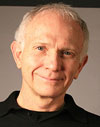
|
Creating Assistive
Technologies - Understanding the Problem
Gayle Curtis, MS
UX Design
Consultant |
Abstract: When we look at the drivers of
effective innovation, we see two complementary themes emerging: First, new
technologies or methods that open the way to new solutions, and second, new
insights or experiences that yield a better understanding of the problem. With
a design thinking approach, we begin by building empathy with the user and the
situation, then we use ideation, prototyping, and iteration to explore,
formulate, and test solutions.
In this class session we will look at ways to gain
understanding of user needs, goals, and values around a problem, as well as the
constraints and requirements of the situations around them. One goal for this
session is for students to identify a set of questions to explore through
interview and observation with real users of assistive technologies. Teams may
also get some good ideas about the people they might approach for both
inspiration and insight.
Biosketch: Gayle Curtis is a UX design
consultant in the San Francisco Bay Area, specializing in user interface
architecture and design strategy for online ventures and interactive products.
Recently he was Principal Interaction Designer at Yahoo!, where he also
developed a practice area in strategic ideation and disseminated it through
workshops in the US and Asia. At Stanford he has held Lecturer appointments in
Human Computer Interaction (CS) and Product Design (ME). Gayle is a graduate of
the MS Engineering Product Design Program at Stanford. |
|
Thursday, January 19th at
4:30pm PST
|
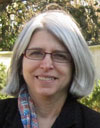
|
Bridging the Gap between
Consumers and Products in Rehabilitation Medicine
Deborah E. Kenney, MS, OTR/L
Stanford University, VA Palo Alto Health Care
System, and Foothill College |
Abstract: Occupational therapists (OTs) are
critical players in the transdisciplinary rehabilitation team. An OT's job is
to help people, who because of illness, injury, or aging, have experienced a
decrease in their ability to function independently in the areas of daily
living, work, play, and leisure. Treatment by an OT often includes the
prescription of assistive technology. This talk will focus on the aspects
necessary to effectively fit the technology to the individual and support the
use of this technology in the home environment, and the impediments to
providing this. She will be joined by a panel of stroke survivors: Albert A.
and Michael W. who will discuss their challenges and the assistive technology
devices they have used.
Biosketch: Deborah Kenney has been an
occupational therapist working with stroke survivors and hand patients for the
last 28 years. She currently splits her time, as a researcher, between Stanford
and the VA Palo Alto Health Care
System. She has collaborated on numerous design / development research
projects with both engineers as well as with graduate, medical, and
undergraduate students. Her work includes testing and integrating technology
into the rehabilitation setting with individuals with Parkinson's Disease, CVA
(stroke), spinal cord injury, hand and orthopedic surgery and rehabilitation,
and balance problems related to aging. Ms. Kenney currently works with
researching problems of hand rehabilitation and treatment related to post
surgical pain and thumb arthritis and continues to develop novel treatments for
post-stroke survivors privately in the community. |
Upcoming In-person Class Sessions
Assistive Technology Faire Vendors
Wanted
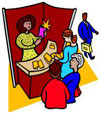
You are invited to participate
in the Assistive Technology Faire - This eleventh annual
course event is scheduled for Tuesday, February 28th and will provide an
opportunity for students and community members to get an up-close look at a
variety of assistive technology devices and learn about available services.
Users of assistive technology products as well as small companies
and agencies serving individuals with disabilities and older adults are
encouraged to join in on this event. Browse to the Call
for Assistive Technology Faire Participants webpage for more information
and contact me to register as a vendor.
Eleven vendors have
committed to participate this coming year. Here is the
line up and
slides from last year's virtual
Faire.
|
Please contact me with your ideas, questions, comments,
and project suggestions - or just to say hello. Please continue to stay safe
& healthy.
Dave Jaffe - Course Instructor
|
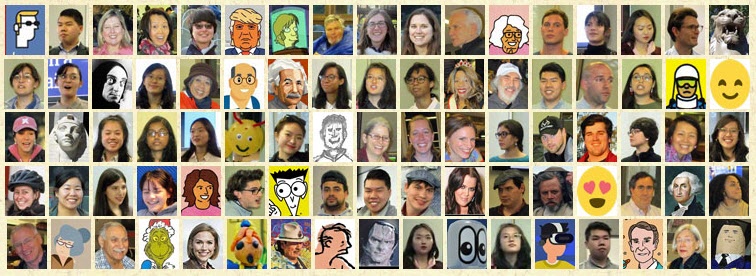
To unsubscribe from this newsletter, please email
Dave. |
|









